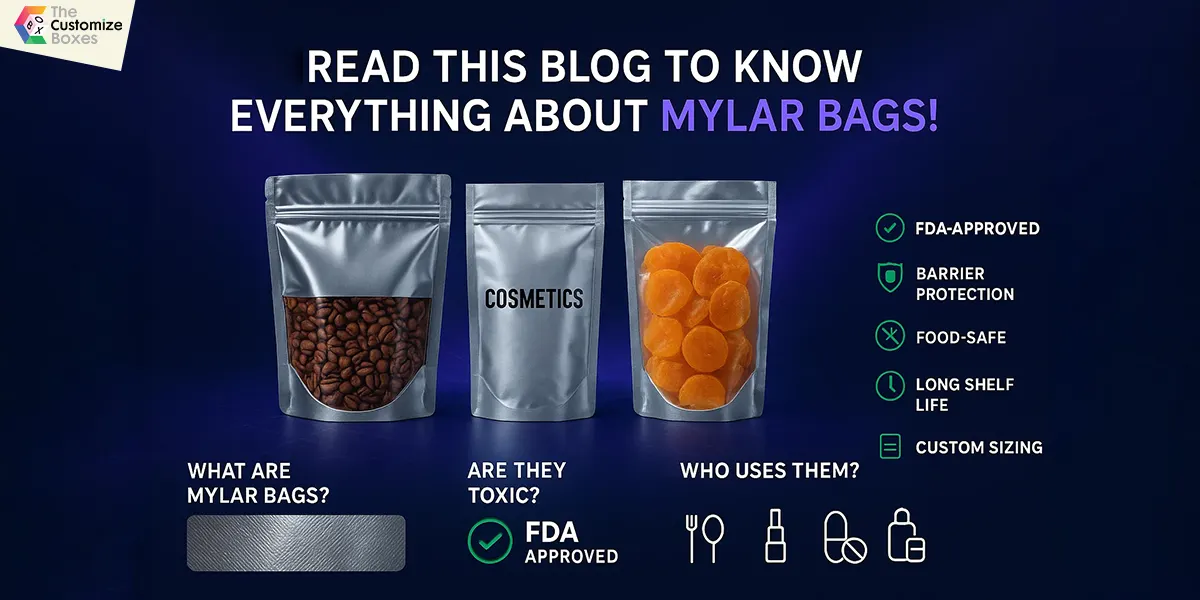
Mylar bags are known for their excellent barrier properties, which keep perishable and non-perishable items safe for a longer time. Food, cosmetic, pharmaceutical, and retail industries highly depend on Mylar bags packaging to ensure their products’ extended shelf life.
One of the questions various people often ask is “Are mylar bags toxic?” The answer is, no, they are not! They are approved as safe by the FDA, and this is why they are often used for storing food for a longer period.
Various considerations should be made when customizing Mylar bags, like thickness, style, design, size, and compatibility with the products.
Want to explore more about Mylar Bags? Read this blog!
What is a Mylar Bag?
A flexible PET film is used to create different types of packaging bags and pouches for packing products that need to be protected from moisture, oxygen, and air. Packaging bags made from polyethylene terephthalate are known as Mylar bags.
The thickness, style, design, and size of Mylar bags can be customized according to the product's needs. PET film is stretchable, allowing you to create every style and shape you want.
A thin metallic layer is also coated on the Mylar bags for added protection and enhanced appeal. Some bags are made from kraft paper, which is coated with a thin layer of polyethylene terephthalate.
Types of Mylar Bags
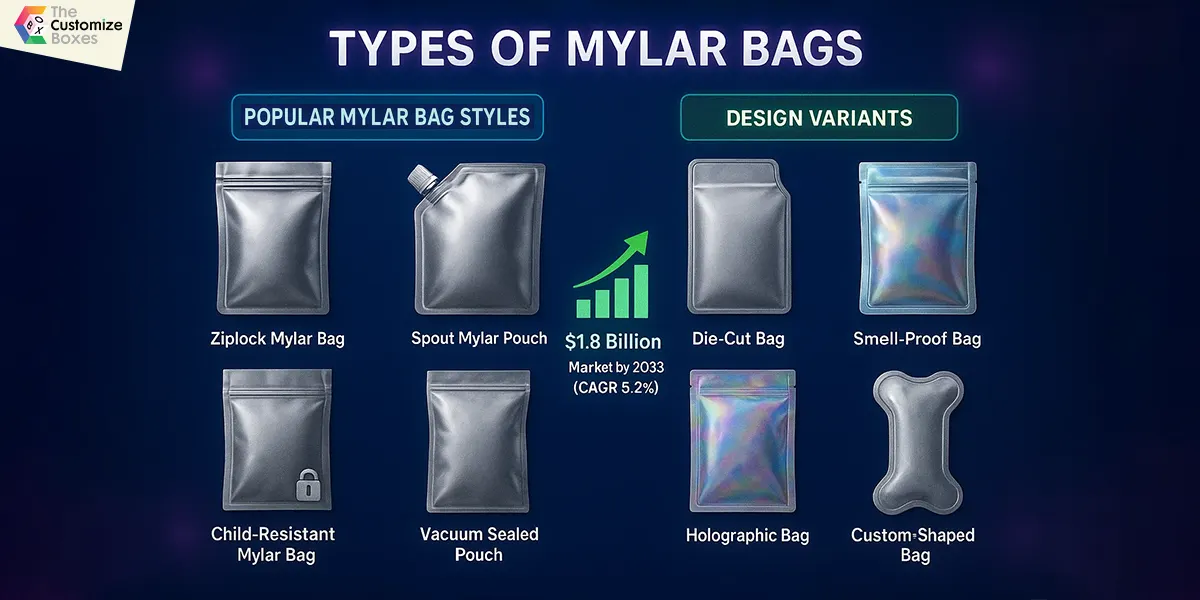
The types of custom Mylar bags depend on various factors like styles, designs, thickness, and sizes. Some popular styles of custom Mylar bags are as follows:
- Ziplock Mylar Bags
- Spout Mylar Pouches
- Resealable Mylar Bags
- Vacuum Sealed Mylar Bags
- Child-Resistant Mylar Bags
However, you may differentiate the types of Mylar bags by their design as follows:
- Die-Cut Mylar Bags
- Smell-Proof Mylar Bags
- Holographic Mylar Bags
- Mylar Bags with Windows
- Custom-Shaped Mylar Bags
The excellent benefits and multiple uses of Mylar bags have led to a surge in their market. Mylar Bags Market is projected to reach USD 1.8 billion by 2033, showing a CAGR of 5.2% from 2026 to 2033
Mylar Bag Size Chart
The best thing about Mylar bags is that they can be customized in every size from extra small to extra large. Some commonly used sizes of Mylar bags are as follows:
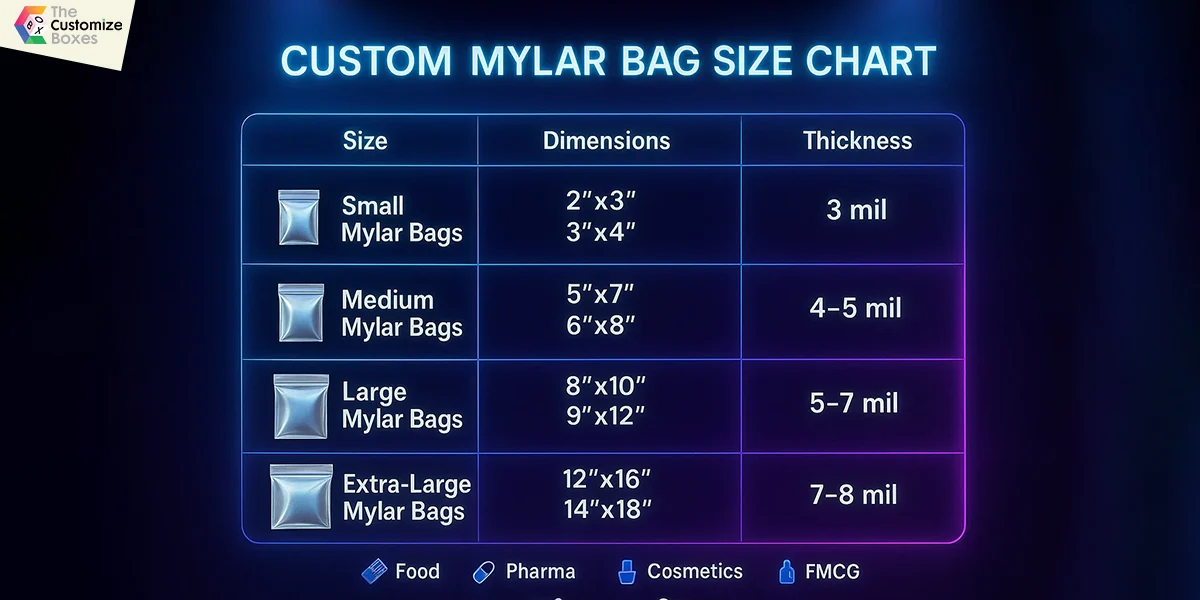
Uses of Mylar Bags
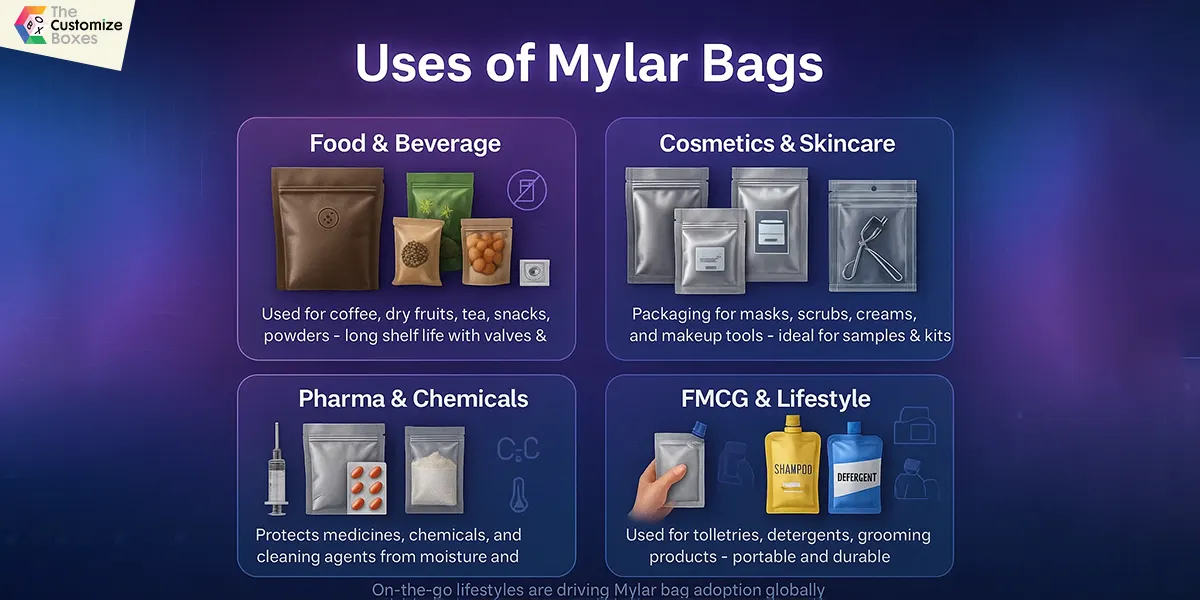
The uses of Mylar bags depend on the products’ nature and their storage needs. Mostly, perishable products are packed in custom Mylar bags for long-term storage. Mylar food storage bags are extensively used in the food industry.
All types of solid, semi-liquid, and gel-based products can be stored in Mylar bags. Degassing valves are often customized on the coffee and tea Mylar pouches to ensure long-term freshness. Likewise, some dried and powdered products are packed with oxygen absorbers to ensure longevity.
The use of Mylar bags is not limited to the food industry; it is also used in the following industries:
-
Cosmetics and Skincare
Most cosmetic businesses use small Mylar bags to pack a limited quantity of their products as product samples for promotional purposes. Face masks, cleansers, creams, scrubs, gels, and powdered masks are often packed in resealable Mylar bags. Also, tools like tweezers, scissors, eyelash curlers, blackhead removing sticks, and sponges are packed in mylar bags for superior protection.
-
Chemical and Agricultural Industry
Agricultural fertilizers and chemicals are stored in large Mylar bags with oxygen absorbers to ensure their long-term storage. Cleaning agents, like bleach and toilet cleaners, are also packed in tear-resistant mylar bags.
-
Pharmaceutical Industry
Some medicines in semi-liquid and powdered forms need to be protected from moisture, air, contamination, and temperature. This is why they are packed in custom Mylar bags. Also, syringes, cannabis, injections, capsules, tablets, and powdered medicines are stored in Mylar bags for long-term storage.
-
FMCG Industry
Fast-moving consumer goods like toiletries and sanitation products like detergents, dishwashers, shampoos, vehicle wash and wax are packed in the spouted Mylar bags for long-term preservation.
Other than the above uses in various industries, the on-the-go lifestyle is also a contributor to the growth of the mylar bags market.
3 Things to Consider for Mylar Bags for Food Storage
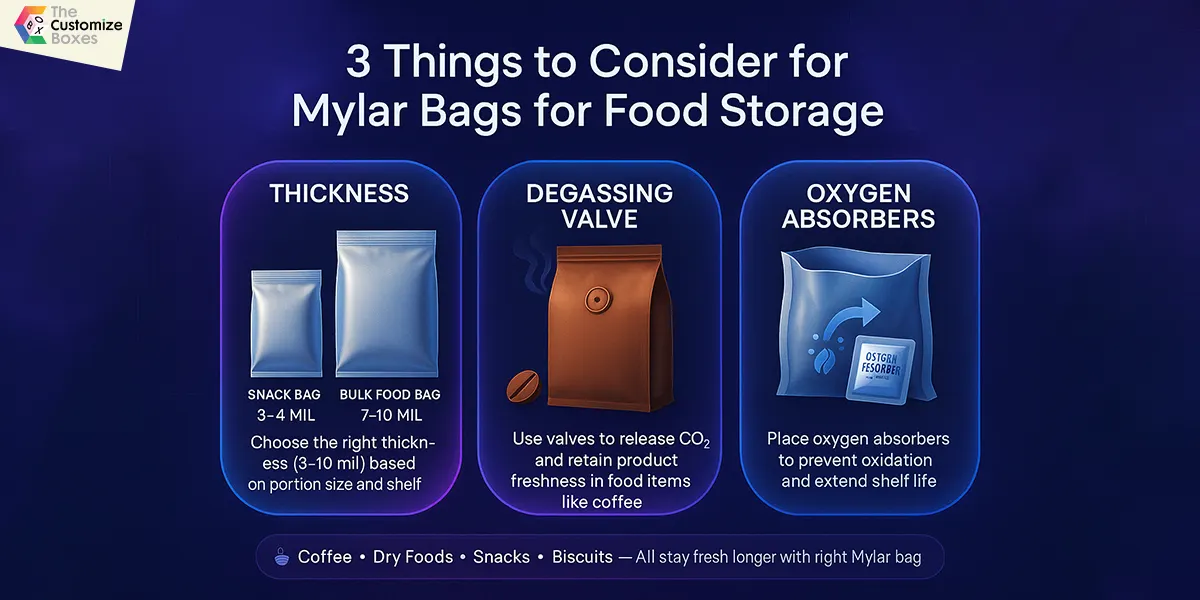
Most people often ask, “How to properly use Mylar bags for long-term food storage?”. The answer is that one must consider the following factors when customizing food Mylar bags:
Thickness
You must understand your product packaging and storage needs to customize the Mylar bag with the right thickness. For example, if you want to customize small Mylar bags for single-serving food items for retail display, the standard thickness will be around 3-4 mil. Likewise, for long-term storage in large mylar bags, you must customize the 7-10 mil thickness.
Degassing Valve
Most food items release carbon dioxide, which may affect the quality and longevity of the product. This is why a degassing valve is added to mylar bags, especially those used for coffee, to release excess carbon dioxide (CO2). This one-way valve helps maintain the freshness and flavor of the food items by preventing the bag from swelling or bursting due to gas buildup. Also, it protects the products against oxidation.
Oxygen Absorbers
Oxygen absorbers are small packets designed to remove oxygen from sealed Mylar bags, extending the shelf life of perishable products by inhibiting bacterial growth.
Final Words!
Concluding the discussion with the fact that now industries are highly relying on the custom Mylar bags due to their excellent barrier properties, functionality, and versatility. So the significance of Mylar bags is completely undeniable!
Mylar bags are ideal for storing food for a longer period of time because they have excellent properties against oxygen, moisture, and air. They are also tear-resistant, ensuring food safety from contamination.
The longevity of custom mylar bag packaging depends on how you customize it and how you take care of it. Mylar bags with higher thickness are tear-resistant, ensuring durability. In short, a mylar bag lasts for up to 20 years if sorted and maintained well.
The following items should not be stored in custom Mylar bags:
- Moist and fresh food items.
- Sharp items with rough edges.
- Chemicals and Reactive Substances.
- Products that produce gas and ferment.
